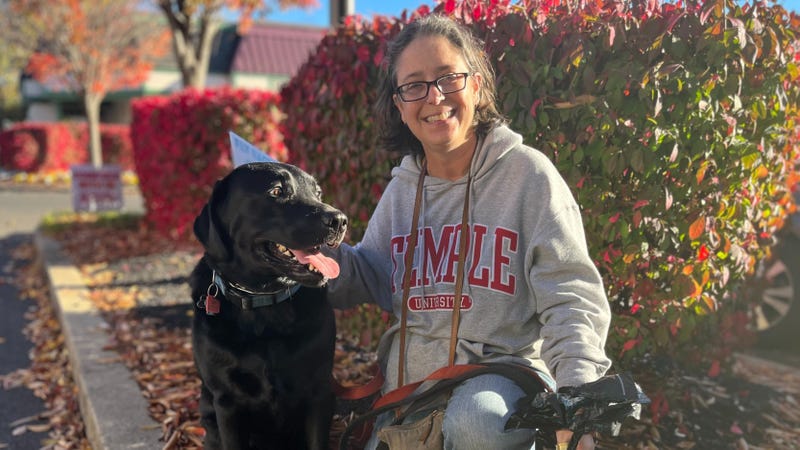
PHILADELPHIA (KYW Newsradio) — Abortion is a hot-button topic this election, since the U.S. Supreme Court’s ruling on Dobbs v. Jackson Women's Health Organization overturned Roe v. Wade and made abortion rights a question for individual states to settle. Many voters are making their midterm decisions based on this single issue.
In 1996, Beth Castiglione says, she was not ready to be a mom. Her birth control failed, and she had a legal abortion at seven weeks pregnant.
“I absolutely did not want a baby,” she said. “I was with the man who's now my husband and the father of our two children. And I was in my mid-twenties. And I was just about to start graduate school and we were moving across the country.”
And for the first time, nearly 30 years later, she is speaking publicly about it — and the impact her choice had on her life.
Abortion as a health care right
Castiglione says mental health was a factor in her decision, and she says making the choice to terminate her pregnancy allowed her to plan the family she loves today.
“And how dare anyone tell me that I'm not allowed to make that kind of decision about my own body?” she said.
If abortion had not been a safe and legal option for her, she said, “Oh, I would have gone to a backstreet abortionist — like, I was going to have an abortion, no matter what. And I would have gotten an illegal one if I had to.”
Asked how she felt after the procedure, she said: “Relieved. Like, just so relieved.”
While she says it was the best decision for her life, it was a difficult one — especially because of her faith. Castiglione says she did not have the support of her conservative Catholic family.
“I think that's how a lot of Catholics are. They just accept the internal conflict of it. But I'm sure there are Catholics other than me who've had abortions,” she said.
After the abortion, Castiglione says she didn’t have health insurance for follow-up care.
“I ended up being in intense pain for about a month.”
For her, the conflict over abortion rights is wrapped up in the issues of bodily autonomy and women’s health care.
“I have bipolar disorder, and I have had an abortion, and it's much less shameful for me to talk about bipolar disorder," she said.
Castiglione says she is choosing to speak out about her experience with abortion now to help destigmatize it.
“This coming election in Pennsylvania, when it comes to mental health issues and women's bodies and women's autonomy, I think it's really important to not be silent.”
Outside of her husband and one friend, she says, she has never said to anyone that she has had an abortion.
“We got onto the conversation because we were talking about going through menopause and how no one talks about menopause. And then I was like, ‘Yeah, and no one talks about abortion. I had an abortion.’
“She was like, ‘You had an abortion? I had an abortion!’” Castiglione said. “And we don't talk about it to anybody — and I've known her for 20 years.”
An unimaginable decision
For Sarah Davis of Collingswood, New Jersey, her experience with abortion came when her pregnancy took an unintended turn, forcing her and her husband to make an unimaginable decision.
“About six years ago, I was pregnant and very excited about it,” Davis said.
She says she was looking forward to starting a family — and she thought everything was fine, until she had her 21-week ultrasound.
“This was going to be the anatomy scan, where we were going to see who would become our baby for the first time and learn about the sex and count fingers and toes,” Davis said.
Instead, they were given news no expecting parent wants to hear.
“The ultrasound tech left the room, and we sat there for what felt like a while, and then a doctor came in,” she said. “And then we were asked to step out into another room with two doctors and a counselor.”
In that room, Davis and her husband learned their fetus had an abnormality and was developing without a skull.
“We were told that the baby would not live outside of my womb for more than a few hours or perhaps minutes,” Davis said. “We went from all of the excitement and anticipation parents have to total devastation.”
At that moment, she says, she couldn’t bear the thought of continuing to grow a being that wouldn’t be able to survive — “and then be forced to birth it.”
With one week in her pregnancy left before reaching Pennsylvania’s 23-week abortion limit — they were living in the commonwealth at the time — the couple chose to terminate the pregnancy.
“Lots of people, when they are faced with that decision, they make choices that could vary from where they thought they would be.”
She had to undergo a mandatory waiting period before she could go ahead with the procedure.
She says that period of time was incredibly difficult on her mental health.
“For me, I had several days to walk around with this very painful reality.”
Pennsylvania law states that abortions after 23 weeks can be performed only if a mother’s life or health is in danger. It’s a limit that Davis describes as “arbitrary.”
“The notion of medical emergency for somebody carrying a child — I think that we're incredibly myopic when we think about what that emergency is. Life or death, when you're talking about mental health, is just as critical.”
Today, Davis and her husband are parents to a healthy 5-year-old girl. She says her abortion made it possible for her to have the family she always wanted.




